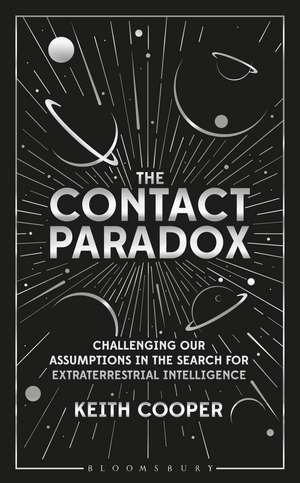The Contact Paradox: Challenging our Assumptions in the Search for Extraterrestrial Intelligence
Autor Keith Cooperen Limba Engleză Paperback – 17 mar 2021
Preț: 57.35 lei
Preț vechi: 75.80 lei
-24% Nou
Puncte Express: 86
Preț estimativ în valută:
10.97€ • 11.46$ • 9.08£
10.97€ • 11.46$ • 9.08£
Carte disponibilă
Livrare economică 14-28 martie
Preluare comenzi: 021 569.72.76
Specificații
ISBN-13: 9781472960450
ISBN-10: 1472960459
Pagini: 336
Dimensiuni: 129 x 198 x 26 mm
Greutate: 0.23 kg
Editura: Bloomsbury Publishing
Colecția Bloomsbury Sigma
Locul publicării:London, United Kingdom
ISBN-10: 1472960459
Pagini: 336
Dimensiuni: 129 x 198 x 26 mm
Greutate: 0.23 kg
Editura: Bloomsbury Publishing
Colecția Bloomsbury Sigma
Locul publicării:London, United Kingdom
Caracteristici
Features plenty of reportage, with the author having interviewed some big names (such as Steven Pinker).
Notă biografică
Keith Cooper is a freelance science journalist and editor. Since 2006 Keith has been the Editor of Astronomy Now, and he is also the Editor of Astrobiology Magazine. In addition he has written on numerous space- and physics-related topics, from exploding stars to quantum computers, for Centauri Dreams, New Scientist, Physics World, physicsworld.com and Sky and Telescope. He holds a BSc in Physics with Astrophysics from the University of Manchester. @21stcenturySETI
Cuprins
Foreword by Stephen BaxterIntroduction: Little Green Men1. The Altruism Assumption2. Intelligence3. Homeworld4. Interstellar Twitter5. Galactic Empire6. Two Clocks7. Messages from Earth8. 21st Century SETIGlossaryFurther ReadingAcknowledgementsIndex
Recenzii
There is growing interest in the possibility of 'alien intelligence', and in how best to search for it. Keith Cooper's broad and balanced perspective on current debates and programmes deserves wide readership.
A thorough and timely overview of the latest thinking in SETI and its controversial offspring, METI. This is a stimulating, provocative and ultimately optimistic enquiry into the biggest question we're ever likely to answer: are we alone?
The mystery of humanity's place in the universe enthrals millions. Whatever strangeness prevails out there, shouldn't we explore, at least with curious minds? The Contact Paradox surveys what science has revealed about this odd cosmos, the vastness of our ignorance and curiosity about any 'others' out there, and some of the steps we can take - even now - to prepare.
In an engrossing narrative, Keith Cooper dissembles our expectations for intelligent alien life down to a set of assumptions we can gorge on with scientific precision. It is a meal guaranteed to expand what you thought was possible, and brings the search for life beyond the Earth from the realm of fiction to that of a scientific endeavour.
With concise and approachable writing, Cooper crafts a worthwhile popular science work about questions that, as scientists continually improve the human capacity for gathering information about the rest of the universe, are becoming increasingly important.
A thorough and timely overview of the latest thinking in SETI and its controversial offspring, METI. This is a stimulating, provocative and ultimately optimistic enquiry into the biggest question we're ever likely to answer: are we alone?
The mystery of humanity's place in the universe enthrals millions. Whatever strangeness prevails out there, shouldn't we explore, at least with curious minds? The Contact Paradox surveys what science has revealed about this odd cosmos, the vastness of our ignorance and curiosity about any 'others' out there, and some of the steps we can take - even now - to prepare.
In an engrossing narrative, Keith Cooper dissembles our expectations for intelligent alien life down to a set of assumptions we can gorge on with scientific precision. It is a meal guaranteed to expand what you thought was possible, and brings the search for life beyond the Earth from the realm of fiction to that of a scientific endeavour.
With concise and approachable writing, Cooper crafts a worthwhile popular science work about questions that, as scientists continually improve the human capacity for gathering information about the rest of the universe, are becoming increasingly important.
